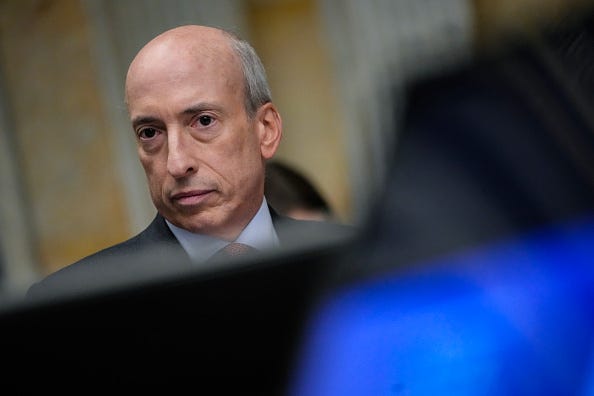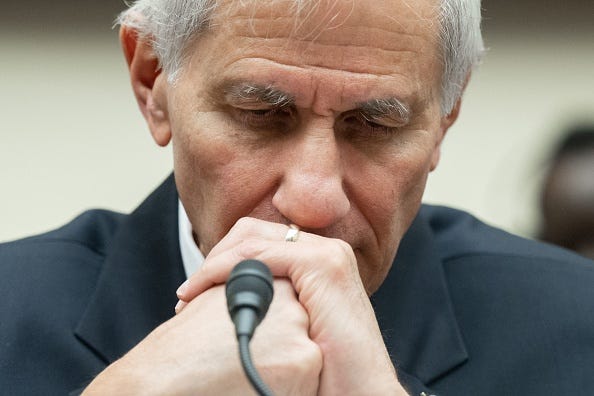That's a Wrap: Themes and Intriguing Moments in Financial Regulation 2023
Capitol Account: Free Weekly Version
It’s the end of the year, so we turn to lists. This week, we published two. Our look-backs at banking and capital markets oversight identify plenty of twists, turns and funny moments. The biggest themes and policy developments will continue to play out in 2024. That includes the already fierce (and growing) battle over the Federal Reserve-led plan to boost bank capital. And, of course, there is the SEC’s rapid rulemaking, which has reverberated across Wall Street.
Thanks for subscribing to out free edition, a digest of articles we published throughout the week. The daily newsletter had many more, including the full “Top 10” retrospectives that are featured below in abridged form (numbers six through 10 are pretty good, we think). To read the full reports, click the button below and upgrade to our paid publication. Happy holidays; Capitol Account’s weekly version will be back in your inboxes on January 6.
Busy, busy, busy: For close observers of capital markets regulation, 2023 looked a lot like 2022. That’s not deja vu – it’s the Gary Gensler show. There’s no question that the SEC chair maintained his standing as the hardest working regulator in Washington. And while he managed to check some rules off his list, many of the agency's controversial, and consequential, policies have yet to be completed. So get ready for 2024.
Still to come: climate disclosure, market structure, mutual fund swing pricing, financial advisers’ use of artificial intelligence, swaps disclosure, safeguarding customer assets and the “dealer” rule upgrading oversight for firms that trade large amounts of Treasury securities. And those are just the pending proposals. Plenty of other hot-button issues are still percolating in the bowels of the commission, including plans on human capital, board diversity, incentive-based compensation and tightening regulation for the private markets.
Does this cause panic in the financial industry? Some. Disbelief? Certainly. Anger? A bit. Resignation? By all means. It’s also sent lobbyists and regulatory lawyers into overdrive (though complaints about short comment periods have started to fade). Even so, it sometimes took weeks before firms were able to grasp fully all the implications of a new SEC proposal. See, for example, the custody plan that blindsided banks because most thought it was directed at crypto. Or the securities lending requirements that hedge funds belatedly realized could reveal when they were shorting a stock.
A couple of trends emerged this year that could ease some of the opponents’ pain – slightly. The biggest: Gensler’s propensity to go big with a proposal and then moderate the final version. So there could be a lot of pullback to pacify critics. That may or may not, however, stop the rush to the courthouse, the other big theme of 2023.
Thus far, hedge funds have filed two cases against major Gensler initiatives. And just this week, the U.S. Chamber of Commerce won a lawsuit to overturn a rule on share buybacks. Most of Wall Street hopes the decision is a harbinger. But the SEC is taking an aggressive posture in court, as well. It recently moved to get one of the hedge fund suits transferred from the U.S. Court of Appeals for the Fifth Circuit, the conservative and pro-business venue where most of the litigation has been filed. Ultimately, it seems Gensler's agenda will be in the hands of federal judges. But for now the jury is still out, so to speak.
What follows is a look back at some of the other important developments, humorous episodes and unusual moments of the year in financial markets oversight.
Capital Markets Oversight Top 10
Most contentious (and over ambitious) proposals: With 50-plus rules, it’s hard to pick just one. But two stand out: the SEC’s plan to heighten custody requirements for fund managers and its proposal to regulate the financial industry’s use of predictive data and artificial intelligence. Both regulations initially garnered little attention – until lawyers gave them a careful read.
Hedge funds, banks, brokers and crypto exchanges have lined up against the custody rule. They argue that the dictates are so over-the-top, and unworkable, that there will be negative impacts on derivatives trading, securities lending, the repo markets and even investments in gold. What may stand out even more, however, is the pushback that came from other regulators. Among those that raised concerns: the CFTC, the OCC and the Fed.
The predictive data plan was at first seen as the Robinhood rule, and overlooked by the more traditional money managers who assumed the measure was aimed at trading apps. But they woke up pretty quickly. Brokerages and investment advisers now point out that the rule is written so broadly that it could conceivably apply to just about every finance firm. Its definition of technology, critics note, seems to cover tools like spreadsheets and calculators – a lot more than AI.
Most frustrated industry: This is, of course, another tough call. But based on the outcry (especially when looking at aggrieved postings on X), the winner is crypto. Token firms spent most of the year predicting/hoping/asserting that Congress would bring “regulatory clarity” to the space. But somehow, they are ending 2023 where they started: battling Gensler over whether digital assets are securities and complaining about “regulation by enforcement.” Neither side is budging. (One big caveat: Grayscale Investments’ win in court over the SEC’s denial of the firm’s Bitcoin ETF application. It’s hard to predict the agency’s next move, but there’s a lot of speculation that a product may be approved as soon as next month.)
Biggest surprise: Gensler’s critics have spent a lot of time citing the now infamous inspector general report that blamed his rules blitzkrieg for exhausting managers and spurring an uptick in agency departures. Count us among the many who were taken aback in April when the SEC got the highest score of any financial regulator in the Partnership for Public Service’s closely followed survey of the “Best Places to Work in the Federal Government.” Overall, the commission came in third place of mid-sized agencies – a stat that the chair has been more than happy to tout when his Capitol Hill critics raise concerns about the effect his relentless pace has on the staff.
Turning down turf? When all you have is a hammer, everything looks like a nail. To a lot of industry critics, the description fits Gensler to a tee – everything looks like a security to the SEC chief. So it was quite the shock when the agency turned down a chance to assert authority over syndicated loans. The issue came to a head earlier this year when the U.S. Court of Appeals for the Second Circuit asked the SEC for its expert opinion on whether the assets are securities. The request spurred a furious lobbying campaign by Wall Street firms, which feared Gensler would make a play to grab oversight of the $2.5 trillion market (which is monitored by banking regulators). After the commission declined the court’s offer, Democratic Commissioner Caroline Crenshaw gave a speech outlining her worries about the lack of protections for both retail and institutional investors in the market. The issue, it seems, isn’t going away.
Help Wanted: Administrative law has never really been a sexy practice area. But it’s certainly on the way up – and the demand for attorneys who specialize in overturning regulations is likely to skyrocket even more in 2024. One attorney who’s phone seems to be ringing off the hook is Eugene Scalia. The Gibson, Dunn & Crutcher partner is representing several trade groups that are challenging a new disclosure rule for private funds. He’s also been advising Citadel Securities on the market structure overhaul, Robinhood on the predictive data rule, the chamber on climate disclosure and the Bank Policy Institute on the Basel endgame capital plan. As one source told us, admiringly (and we assume at least half-jokingly): “Gene will be able to buy an airplane when it’s all done.”
Epic face-off: Few mutual fund executives will likely forget Gensler’s tension-filled appearance (via video) at an Investment Company Institute conference …(Wednesday; full list here.)
Thanks for reading. Follow us on X @CapitolAccount and on LinkedIn by clicking here. We’re always looking for stories, so if you have any suggestions on what we should cover (or comments about Capitol Account), shoot us a note. Jesse can be reached at: jwestbrook@capitolaccountdc.com, Rob at: rschmidt@capitolaccountdc.com and Jessica at: jholzer@capitolaccountdc.com. If somebody forwarded this to you and you’d like to subscribe, hit the button below. Please email for our special rates for government employees and academics, and group discounts for businesses: subscriptions@capitolaccountdc.com
Mini-Crisis Spurs Rules Overhaul: Looking back at the year in banking oversight, few would disagree on the pivotal moment: March 10. The collapse of Silicon Valley Bank, fueled by the fastest depositor run in history, shook the financial system – and the Washington regulatory apparatus. The fallout included two more regional bank failures, but fears of another 2008 meltdown proved to be unfounded. Nevertheless, the market panic set the stage for an epic battle over tougher capital and liquidity rules for large banks. It also sparked a renewed focus by lawmakers on supervisory lapses by the regulators.
It may be hard to remember, but when the spring turmoil erupted the industry was mostly riding high. Executives were still patting themselves on the back about their institutions’ resilience during the pandemic, and boasting about passing out billions of dollars in government assistance to small businesses. Firms were even petitioning for an extension of softer covid-era capital treatment. But after SVB, any thoughts of a deregulatory agenda quickly died. Banks would spend the remainder of 2023 on the defensive.
The mini-crisis also pushed Fed Vice Chair for Supervision Michael Barr, who’d been quietly on the job for eight months, into the spotlight. The Biden administration’s most powerful bank regulator, he oversaw the central bank’s self-assessment. It zeroed in on “weaknesses in regulation and supervision that must be addressed.” Like any good government report, it pinned much of the blame on the previous administration and its relaxation of rules for regional lenders.
Barr’s main fix, significantly hiking capital requirements for firms that have more than $100 billion in assets, hasn’t gone over well (to put it mildly) with the industry. It has also triggered rebukes from Republicans in Congress and at the banking agencies.
The July proposal, known as Basel III endgame, set off a frenzy that will continue to play out well into the new year. The fight, easily the most contentious in financial regulation, is also perhaps the most unusual – it involves an issue that few people understand or care about. But that hasn’t stopped opponents from trying to sway opinions. Now to the amusement of many, when you ride a bus in Washington or turn on an NFL game, you can see ads demanding policy makers put a stop to Basel.
While the capital battle has consumed the banking agenda this year, there were many other important developments, themes, funny moments, surprising turns, and even a good old-fashioned scandal that colored the year. What follows are ten of our favorites. (Tune in tomorrow for another list on capital markets oversight.)
Banking’s Top 10
Most beleaguered regulator: This is an easy call. Martin Gruenberg has dug in at the FDIC in a bid to wait out the scandal engulfing his agency. It’s anyone’s guess as to whether the longest-serving FDIC chief survives the mushrooming probes into allegations of the agency’s toxic workplace culture. But it’s clear the industry, who sees him as a major foe, wouldn’t be mourning his departure. That’s also why it's a pretty good bet that he hangs on – a sudden exit would leave the regulator helmed by the Republican vice chair, and more importantly, stymie the Basel plan.
Most hated slogan: Nothing gets under the skin of the banking industry more than the use of the term “junk fees.” CFPB Chairman Rohit Chopra – a man whose strong grasp of public relations is evidenced by how often he gets on the stage to make a policy announcement with President Joe Biden – seems to know this inherently. And this year, he pointedly tossed the term around any chance he got. Don’t expect Chopra to let up in 2024, especially as the consumer bureau gears up to take on overdraft fees.
Hottest trend: While there has often been a broker or hedge fund (and, of course, the U.S. Chamber of Commerce) willing to sue the SEC, banks have been particularly loath to take a prudential overseer like the Fed to court. Not anymore. “Sue your regulator” has become the biggest craze in financial regulation – and the once reluctant banking industry is leading the charge. The Basel proposal is, not surprisingly, the main target. But there could be other challenges in the works. Randal Quarles, the Fed’s former vice chairman for supervision, also got into the game, urging lenders earlier this year to sue the central bank over its “illegal” stress tests.
Funniest proposal: The ever voluble Jamie Dimon wins this prize for his offer at a congressional hearing this month to run the scandal-tarred FDIC. “I would love to take it over, and take it off your hands and manage it ourselves,” the JPMorgan CEO told the Senate Banking Committee.
Biggest plot twist: When the Supreme Court agreed to hear a case challenging the CFPB’s funding earlier this year, the consumer regulator’s biggest champions like Elizabeth Warren were frantic that the right-leaning majority would neuter the agency. Yet in oral arguments this fall, several conservative justices seemed skeptical about the contorted constitutional arguments made by the payday lenders trying to kill off the regulator. They also worried that an adverse decision could disrupt the Fed and other banking overseers. While you never can predict how the high court will rule, there’s been little talk since about curbing the CFPB.
Oddest couple: Who would have guessed that one of the Senate’s Trumpiest Republicans would hit it off with the Biden administration’s most progressive financial regulator? But as it turns out…(Tuesday; full list here.)
Thinking about subscribing to Capitol Account? Make it a New Year’s resolution. We have group discounts and special rates for government employees and academics. Stay on top of the news:




